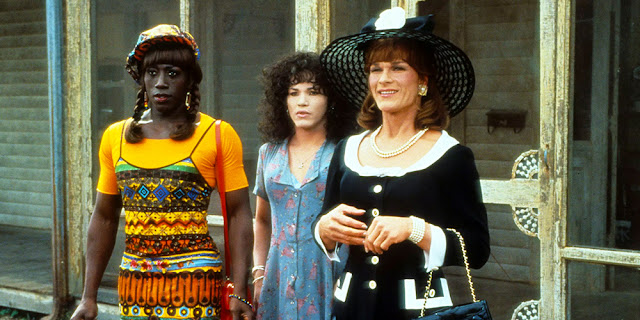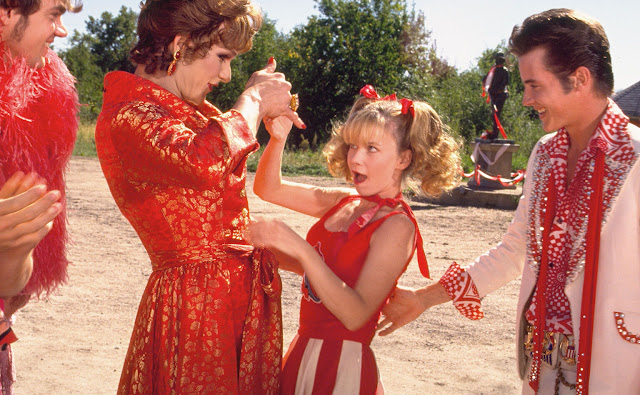This review is going to contain minor spoilers of the film discussed so if you wanted to watch it and feel like this would ruin the experience for you, then here is your warning to stop reading and go and watch the film.
*
It can seem, if you don't interact with the LGBT community much, that drag culture just popped into existence. That it was invented by RuPaul and that it's purpose is to entertain mass audiences. I'm not a historian and I don't plan on preaching on the long history of drag competitions, of drag queens and gender fuckery, or its appropriation in the mainstream. There are people who are much more informed who can do that for me. What I do want is to highlight is the state of queer film during the 90s, how much of it gained a cult status with queer audiences. I'm thinking along the lines of Gregg Araki, Cheryl Dunye and Gus Van Sant.
To Wong Foo, Thanks for Everything! Julie Newmar (1995) fits neatly into this, displaying drag culture out in the wild, on the road and interacting the heterosexual sensibilities. The film follows three drag queens, Noxeema, Vida and Chi-Chi, two of which having won a drag pageant and intend on travelling by car to their next pageant, taking with them a photo of Julie Newmar for good luck (this is where the title comes from). They invite along Chi-Chi in the hopes of teaching her how to act like a true queen.
The road, as a liminal space, serves as safety from the potential abuse of heteronormativity and enforced gender expression. It's only when they are stopped by the police that this space becomes a danger and they must find somewhere obscure to hide. Whilst initially a road movie, after they break down in the middle of nowhere, they must stay in a small village full of people that seem like the antithesis of everything they represent: freedom of expression, confidence and the literal mobility to leave once their car is fixed. What ensues is a transformation, where the queens teach the people of this village how to lead to fulfilling lives and become better people.
 |
| Source: Hornet |
The appeal of the road trip is freedom, often given to those who first have the resources to travel. You gain freedom by already having it. The tools in this film for freedom are expressing femininity through drag, gaining access to the pageant they must travel to and the car they use to get there. It is not just the freedom to be themselves that they gain access to, it's their queerness that specifically allowed for this.
The drag in this film is essentially permanent for the runtime, with the three leading actors remaining in their dresses, wigs and make-up pretty much whole time, and the whole time, they are referred to as "she". I think this could have so easily been a comedy in which three men dress up as women and that be the joke; or worse, it could have been a dig at trans women. What the film does early on is make the distinction between being transgender and dressing in drag, and from that point, refuses to make the act of expressing oneself as feminine a joke. In fact, the way the queens dress is repeatedly stated to be an act of freedom and this over-the-top femininity expressed throughout is transplanted into the village they inhabit. The women of this village (and some of the men) get a movie make-over, a trope that is fairly common, and it's through this, they gain the confidence to be themselves. This is most poignant through the character of Carol Ann, who is able to gain the courage to leave her abusive husband after being defended by the queens and transformed both physically and emotionally through the experience.
 |
| Source: Amblin Entertainment |
What I liked is that the small town in this film is deliberately familiar, where everyone knows one another. When you're queer and you grow up in this space, the last thing you want is for other people to know your business, for fear of repercussions. However, the space is transformed into one of temporary sanctuary, where queerness is not attacked or even questioned but accepted by virtually everyone. And those that disagree with that are chased out.
Despite the RuPaul cameo, I think this film has aged fairly well and is able to capture the deep anxiety of rural spaces for queer people, whilst maintaining the joy of finding small pockets of community where identity can be freely expressed. The fear within me that the three main actors would turn this into a joke, considering their previous hyper-masculine roles, almost made me cringe at the idea of watching this. But they took the roles seriously, which felt like a sign of respect for LGBT culture. This is an important film that is so very applicable today, and it has a special place in my heart because of that.
*
Thank you for reading this post! If you enjoyed it, please consider donating to my Ko-fi. It's a one time donation of £1 and it would really help me out x